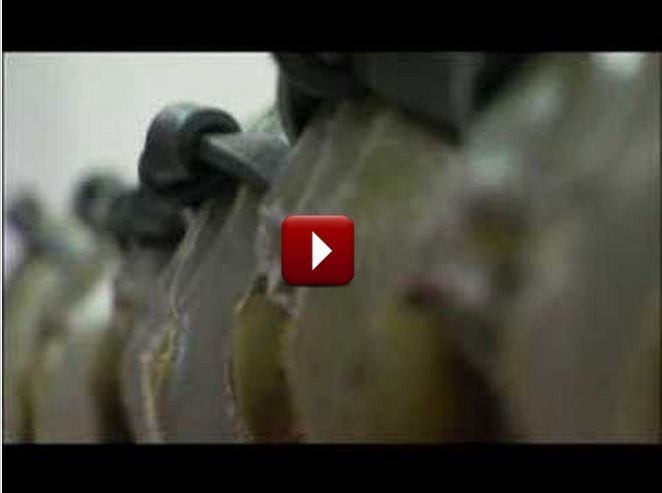Living Since 350 Million Years, Milked for Blue Blood
يعيش منذ 350 مليون سنة ويحلب دمه الأزرق
This is not a war helmet dripping some blue fluid!
هذه ليست خوذة عسكرية يقطر منها سائل أزرق!
It is a living horseshoe crab milked for its blue blood! And chances are that you owe your life to these crabs who have been living on earth for more than 350 million years!
In the 1950s, scientists discovered that LAL (Limulus amoebocyte lysate), which is found in the horseshoe crab's blue blood, has an amazing characteristics in detecting bacteria, fungi, endotoxins, and other contaminants; and coagulating into a thick gel around such invaders even the tiniest ones that are less than one part per trillion. The result is a simple surefire way to detect impurities in pharmaceutical drugs and medical supplies.
اكتشف العلماء في الخمسينات أن لمادة لال (ليمول أميوبوسايت لايسيت) الموجودة في الدم الأزرق لسرطانات حدوة الحصان خواص مذهلة في اكتشاف البكتيريات والفطريات والسموم والشوائب الأخرى وأنها تخثرها على شكل هلام سميك يحيط بهولاء الغزاة حتى أصغرهم الذي لا يتجاوز جزء واحد من التريليون. والنتيجة هي وسيلة بسيطة ومؤكدة النجاح للكشف عن الشوائب في العقاقير الدوائية والمستلزمات الطبية.
Horseshoe crabs سرطانات حدوة الحصان
Horseshoe crabs' blue blood, which contains copper in its oxygen-carrying protein, hemocyanin, not iron like iron-based hemoglobin in humans.
About 500,000 horseshoe crabs are collected annually along the U.S. coast, by five companies licensed by the FDA to produce and sell LAL, without killing the creatures. Crabs are milked in labs and then returned to the sea.
سنويا يتم جمع حوالي 500 ألف سرطان حدوة حصان على طول سواحل الولايات المتحدة، من خلال خمس شركات مرخص لها من قبل ادارة الاغذية والعقاقير لانتاج وبيع مادة لال وبدون قتل السرطانات. يتم حلب السرطانات في مختبرات ثم تعاد حية إلى البحر.
Crabs are collected from the shallow beaches.
تجمع السرطانات من المياه الضحلة للشواطيء.
Cleaned from sand, barnacles, and debris, and inspected for injuries.
تنظف من الرمل والفروع والشوائب وتفحص إذا كانت مصابة.
In labs, blood is drawn from the crab's primitive equivalent of a heart.
في المختبرات يسحب الدم من السرطان من ما يشبه القلب البدائي.
Racked and 100 ml of blue blood drained from each crab.
تصف ويسحب حوالي 100 ملل من الدم الأزرق من كل سرطان.
The same day, the alive crabs are released 100km away to ensures no re-blooding.
تعاد السرطانات في نفس اليوم إلى البحر على بعد 100 كلم للتأكد من أنها لن مرة أخرى.
Coagulogen, the basis of LAL is extracted. LAL is worth $15,000 per liter.
يستخلص الكواجيولوجين وهو أساس مادة لال. ويقدر ثمن كل ليتر بخمسة عشر ألف دولار.
LAL is ready for use even on the International Space Station.
عبوات لال جاهزة للاستخدام حتى على محطة الفضاء الدولية.
Watch this video شاهد هذا المقطع
المصدر
موضوع ذات صلة
الدم الازرق واسراره
















 رد مع اقتباس
رد مع اقتباس



